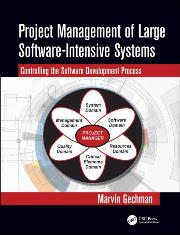BOOK REVIEW
 Book Title: Project Management of Large Software-Intensive Systems: Controlling the Software Development Process
Book Title: Project Management of Large Software-Intensive Systems: Controlling the Software Development Process
Author: Marvin Gechman
Publisher: CRC Press
List Price: $99.95
Format: Large paperback, 366 pages
Publication Date: 2019
ISBN: 978-0-367-13671-0
Reviewer: Lauren Puglisi, MBA, CAPM
Review Date: June 2019
Introduction
Marvin Gechman offers a “shopping list” of activities and tailoring for large software system developments. With over 57 years of software experience, including 34 in the aerospace industry, he was chosen in 1994 as “the person most responsible for Software Process Improvement” at Lockheed Martin.
Currently President at Escon Software and System Consulting, Mr. Gechman explains how scaling up from smaller projects may no longer be appropriate on large systems development. Working well by themselves, individual components, when interfaced with numerous other hardware and software, can become a System of Systems and difficult to integrate by scaling alone.
Although in a software-intensive system the software is the predominant factor, there are many other scaling considerations such as staff, budgets, deadlines, policies, regulations, procedures, and constraints.
Mr. Gechman states the results of the CHAOS Report, published by The Standish Group, 2016:
-
- 32-35% of projects completed successfully
- 19-24% were failures
- Being late, over budget, or having fewer features challenged 44-49%
The principle of the book is to help project managers and their teams understand how to perform the intended system functions, make the integration seamless, and to increase success. This book deals with large systems and is advanced, technical and detailed.
Overview of Book’s Structure
As a good project manager would do, the author breaks down the information into six functional interactive domains: System, Software, Resources, Critical Elements, Quality, and Management.
The book is rich with definitions, acronyms, tables and figures. The figures are a visual expression of structures, functions, responsibilities, and project dependencies and hierarchies. Flowcharts assist with understanding complex interactions and the bibliography includes 185 references for further study.
There are also nine appendices with titles such as Criteria for Evaluating Commercial Off-the-Shelf (COTS) and Reusable Software Products, and Software Roles and Responsibilities for Skill Groups.
Highlights
I have chosen one highlight from each of the sixteen chapters to offer a taste of what Mr. Gechman deems important.
- Chapter 1: Software Project Management Introduction
Success and failure depend on strategic planning.
- Chapter 2: Software Project Management Activities
Every large project should use an automated database for requirements management and traceability.
- Chapter 3: System and Software Lifecycle Processes
Failure can happen even when the system meets requirements and quality but has not been tested in the intended operational and expected environment. (building a plane vs. flying it)
More…
To read entire Book Review, click here
About the Reviewer

Lauren Puglisi
Texas, USA
![]()
Lauren Puglisi, MBA, CAPM is an accountant, project management professional, and business analyst with 20 years of experience in the real estate and civil engineering fields.
Lauren can be contacted at www.linkedin.com/in/laurenpuglisimba
Editor’s note: This book review was the result of a partnership between the publisher, PM World and the PMI Dallas Chapter. Authors and publishers provide the books to PM World; books are delivered to the PMI Dallas Chapter, where they are offered free to PMI members to review who agree to provide a review within 45 days; book reviews are published in the PM World Journal and PM World Library.
If you have read a good recently-published book related to managing programs, projects or teams of professionals, consider authoring a book review for publication in the PM World Journal. For our standard format or for more information, contact Editor@pmworldjournal.com or visit https://pmworldlibrary.net/book-review-program/
If you are an author or publisher of a project management-related book, and would like the book reviewed through this program, please contact Editor@pmworldjournal.com.









